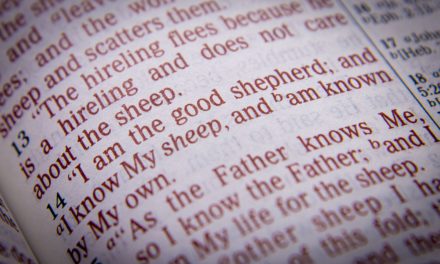Milk, Meat of the Word and the Agribusiness Model
By James Huskins
McDowell County
Real milk is delicious, and for thousands of years, it was ubiquitous. Milk’s use and preservation is an art form which has blessed us with untold varieties of cheese and fermented milk products. Even after decades of anti-dairy lobbying from every official source, and in spite of the success of the dairy industry in denaturing one of nature’s most perfect foods, dairy is still the number one source of protein in the American diet.
Less than a century ago, dairy, along with every other area of food production, moved from a mostly home-based craft to a mostly industrial product. Anne of Green Gables was happy to milk her cow before school, but Rosie the Riveter was in a hurry to get to her factory job. Is it a coincidence that the knowledge and practice of God’s Word—spiritual food—also experienced a steep decline as we handed over production of physical food to powers and systems beyond our knowledge or control? Consider the production of agribusiness milk.
The first step is accumulation. Processors blend the produce of thousands of cows. Some of them pass along bacteria from normal infections and injuries. Some milk is contaminated by poor handling. The most common contaminant is bovine fecal matter. Fresh milk contains vast quantities of beneficial, probiotic bacteria, but harmful bacteria find a fertile host. Accumulation means that every drop is exposed to something that makes people sick.
Next comes pasteurization: cooking to kill harmful bacteria which enter during accumulation. This step is necessary in the industrial model, but no one ever admits that cooking also kills the beneficial bacteria, destroys health-enhancing enzymes, and negatively alters or eliminates proteins and vitamins found in fresh, raw, uncontaminated milk.
After the cooker, milk endures homogenization. The wonderful, health-promoting butterfat in fresh cow milk comes in the form of large globules which rise to the top. Milk from our Jersey shows a cream line several inches deep within a few hours. We skim some of that cream and turn it into butter, use it in coffee and tea, pour it over fresh fruit…!
The dairy industry has decided that cream must not separate, so they process milk in high-speed centrifuges or force it through micro mesh screens to break the fat globules into tiny bits that mix with the milk. This supposedly makes milk “taste creamier,” but it actually masks how little cream is included in “whole” milk. It also breaks up the leukocytes, bacteria, and everything else resulting from accumulation so that they are evenly distributed. This keeps the “added components” from settling to the bottom of the container as an unappealing sludge during transportation and storage.
After all the processing, milk is then packaged and marketed. Shoddy content is masked by a slick presentation. Diminished nutrition is hidden by words like “enriched” or “fortified.”
Now, consider the parallels between the way we get our milk and the way we feed our faith:
Most Christians have no idea that their “belief system” is the result of accumulation. Bible literacy tests tell us that many regular church attenders cannot differentiate between God’s Word and ideas from Buddhism, Shakespeare, Benjamin Franklin, Kahlil Gibran, The Beatles, or popular preachers. Few believers are aware that almost every aspect of popular “Christian” holidays is taken directly from the same pagan worship practices that caused God to wipe out entire Canaanite tribes. This sordid accumulation of “spirituality” is only possible because sincere Christians have allowed someone else to tell them what they believe rather than work to acquire an intimate knowledge of God’s Word.
As with pasteurization, many believers choose to “boil down” the Word of God. They find objectionable components in scripture, so they get rid of them. The New Testament makes it clear that the only way to love God is to keep his commandments. The Son of God says that God’s law will be in full force for as long as Heaven and Earth remain. Yet, many believers insist that “grace” gives them license to violate God’s clear instructions for living found in the first five books of the Bible.
Homogenization is a picture of the way believers force random information through the tiny aperture of our limited familiarity with God’s Word. We believe what our preacher said or what we read in a book. I respect all those sincerely attempting to understand and teach God’s Word, but no one else will stand in your place on Judgment Day. The only way to know God’s perspective is to read The Book with an open mind. Most who read the Bible from the beginning to see what God says are changed.
The marketing of faith is a cliché. “Successful” churches are those with the largest numbers, the nicest buildings, the best entertainment. Jesus commissioned us to “make disciples.” Disciples live as he lived. Remarkably few “church goers” appear to hold His standards.“Grace” is the universal excuse, but grace is not license to sin. Scripture says that sin is breaking God’s law. Disciples pursue holiness, not excuses. Grace is what allows us to live holy lives in the midst of a perverse culture. God loves us and offers salvation by grace through faith, but He does not save us to continue in sin. The resounding message of the New Testament is: “If you love Me, keep my commandments.” The milk of salvation is easy to digest, but the meat of the Word tells us that, once we are saved, He insists on us leading lives of obedience.
Obedient Heart Fellowship believes that the entire Bible is true and relevant. We accept salvation by grace through faith in Jesus, and we attempt to love and serve Him by keeping his commandments. We meet each Sabbath—Seventh Day—at Abba’s House, 72 South Main Street in Marion. 10:00 A.M. 828-460-7913
_______________________________________________________________________
Jim & Beverly Huskins are members of Obedient Heart Fellowship.
______________________________________________________________________







